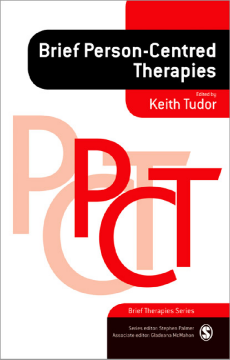
Additional Information
Book Details
Abstract
`This is a book that the person-centered psychotherapy community has been waiting for ... this book opens a creative space in which the ongoing conversation about therapeutic efficacy in times of shrinking resources can be successfully engaged' - Professor Maureen O'Hara, Chair, Department of Psychology, National University, La Jolla, California
`A wide-ranging and scholarly book which shows that person-centred therapy is fully alive to the challenges of the twenty-first century and is breaking new ground both clinically and theoretically' - Professor Brian Thorne, Emeritus Professor of Counselling, University of East Anglia
"Likely to be of interest to anyone involved in counselling" -
Times Higher Educaton Magazine, May 2009
Can the person-centred approach work in time-limited psychotherapy and counselling? This is a question that many practitioners grapple with as demand for brief therapy increases - particularly in the public sector. Brief Person-Centred Therapies is the first book to tackle the subject, bringing together the experience and insights of a leading international team of person-centred therapists.
The book examines the philosophical and theoretical 'fit' between the person-centred approach and brief therapy. It also explores the issues which arise when working briefly in a range of different settings, including primary care, higher education, business, and prison, with couples and groups.
Brief Person-Centred Therapies is essential reading for all person-centred trainees and for practitioners who want to work in services where brief or time-limited work is required or favoured.
Keith Tudor is a UKCP registered psychotherapist, and has a private/independent practice in Sheffield offering therapy, supervision and consultancy.
`A wide-ranging and scholarly book which shows that person-centred therapy is fully alive to the challenges of the 21st century and is breaking new ground both clinically and theoretically. It demolishes convincingly and authoritatively the common criticisms that the approach can only serve an articulate middle-class and is ill-suited to brief and focused work' - Professor Brian Thorne, Emeritus Professor of Counselling, University of East Anglia
`This is a book that the person-centered psychotherapy community has been waiting for...this book opens a creative space in which the ongoing conversation about therapeutic efficacy in times of shrinking resources can be successfully engaged' - Professor Maureen O'Hara, Chair, Department of Psychology, National University, La Jolla, California
